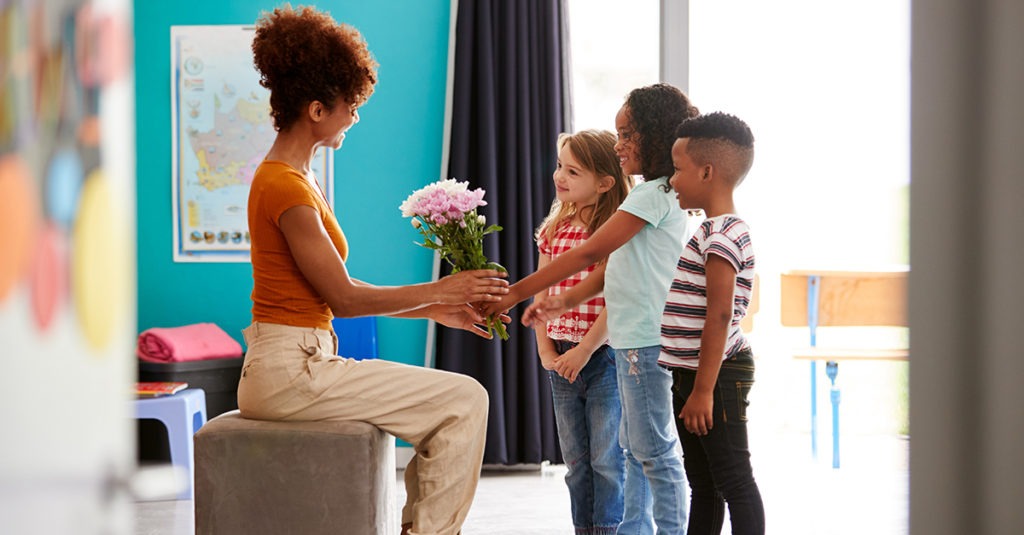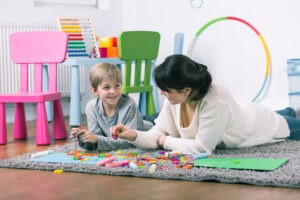With the holidays upon us, parents often try to take time amongst the hustle and bustle to reinforce a very important concept in their children’s lives – gratitude.
We talk about giving thanks in November, and encourage saying “thank you” for gifts in December. But how can we go further to truly teach kids to cultivate gratitude? And, how do we keep this going throughout the year to instill the concept in them as they grow?
Benefits of Practicing Gratitude
Of course we want to raise our children to be polite and gracious to others. There are several other reasons why encouraging our children to practice gratitude can be one of the best things we teach them. Here are a few:
#1: Gratitude is linked to happiness.
According to a study published in the Journal of Happiness Studies in 2019, gratitude is correlated with happiness in children by age 5. Teaching our kids to be grateful early on can help instill this skill and help them grow up happy.
#2: Children who practice gratitude have more life satisfaction.
Studies have shown that children who maintain a sense of gratitude have strong friendships with their peers, are less likely to experience depression, and even make better grades.
#3: Gratitude is correlated with physical health.
Expressing gratitude can lead to some pretty amazing health benefits! For example, enhancing sleep quality and overall physical well-being.
#4: Improved resilience.
With the changes brought on by the Coronavirus pandemic these past few years, it’s clear that resilience is so important. Gratitude has been linked to more emotional resilience – an invaluable skill for our kids to have throughout their childhood and into adulthood!
More research continues to emerge on the benefits of children practicing gratitude. You may have heard about the many scientifically-proven ways that practicing gratitude can benefit our bodies and minds as adults.
Showing appreciation can help you form new friendships. People who practice gratitude are physically more healthy, and may live up to 7 years longer!
Ways to Teach Gratitude
Since expressing gratitude can help kids be more optimistic, resilient, happy, and healthy, what are some strategies for teaching this concept? Here are a few ways to instill this concept!
#1. Set a Good Example
Remember, your children are always watching you. Be the best role model you can be by taking every opportunity to practice gratitude in your own life.
Some everyday ways to show gratitude? Start a gratitude journal and write at least 1 entry at the end of each day. Talk to your kids about some of the things you are writing, and why. (Bonus: this can also help improve your own wellbeing!).
Something like the My First Gratitude Journal is a great way for kids to follow your example!
Make a point to say “thank you” during daily interactions, like when somebody holds the door for you as you and your child enter a store. Demonstrate gratitude by thanking your child for positive acts like good listening at home.
#2. Start a Routine for Expressing Thankfulness
Incorporate gratitude into a daily routine in your family. If you tend to eat dinner together at the table most nights, take turns going around and naming something you were grateful for during your day. Starting with yourself and the older kids at home can help younger children better understand the concept.
#3: Return the Favor
If a friend at school draws your child a picture, encourage them to draw something in return. Did a family member send your child a new toy? Depending on your child’s age, help him or her send an email or write a letter to the family member thanking them.
#4: Read about Gratitude
Stories like The Berenstain Bears Count Their Blessings and Llama Llama Gives Thanks specifically show ways to experience and express gratitude.
Even if you and your child aren’t reading a book that specifically focuses on gratitude, look for instances in other stories (or even movies and TV shows) in which the characters show thankfulness to others. Point these out to your child so he or she takes note too!
#5: Engage in Activities to Show Gratitude for Less Tangible Things
Explaining The Concept of Gratitude
TherapyWorks offers Speech Therapy with Speech-Language Pathologists experienced in helping children verbally express their thoughts and understand age-appropriate concepts.
TherapyWorks offers Speech Therapy, Occupational and Physical Therapy both in-home and through teletherapy (nationwide). If you would like to learn more, or discuss your child’s specific needs, please don’t hesitate to reach out to TherapyWorks!




